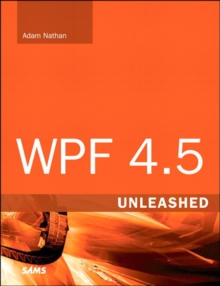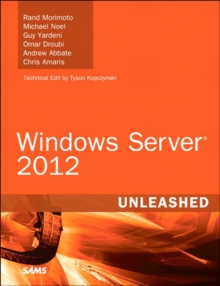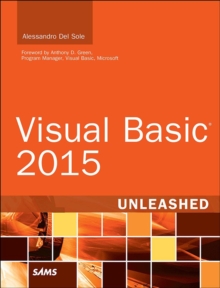
Windows Communication Foundation Unleashed (Adobe Reader) PDF
by Craig McMurty, Marc Mercuri, Nigel Watling, Matt Winkler
Part of the Unleashed series
Description
A new edition of this title is available, ISBN-10: 0672330245 ISBN-13: 9780672330247
Windows Communication Foundation (WCF) is a new Microsoft technology for allowing software to communicate. Superseding earlier technologies, such as COM/DCOM, .NET Remoting, ASP.NET Web Services, and the Web Services Enhancements for .NET, WCF provides a single solution that is designed to always be the best way to exchange data among software entities. It also provides the infrastructure for developing the next generation of Web services, with support for the WS-* family of specifications, and a new serialization system for enhanced performance. For information technology professionals, WCF supplies an impressive array of administration tools that enterprises and software vendors can use to reduce the cost of ownership of their solutions without writing a single line of code. Most important, WCF finally delivers on the long-postponed promise of model-driven software development with the new software factory approach, by which one can iteratively design solutions in a modeling language and generate executables from lower-level class libraries.
Windows Communication Foundation Unleashed is designed to be the best resource for software developers and architects working with WCF. The book guides readers toward a conceptual understanding of all the facilities of WCF and provides step-by-step guides to applying the technology to practical problems.
- Introduces you to WCF and then takes you deep inside the technology
- Gives you nearly 100 best practices for programming with WCF
- Provides detailed coverage on how to version services that you will not find anywhere else
- Delves into using WCF together with Windows Workflow Foundation and Windows CardSpace
- Provides detailed coverage of the new high-performance data contract serializer for .NET
- Walks you through how to do secure, reliable, transacted messaging, and how to understand the options available
- Introduces you to federated, claims-based security, and shows you how to incorporate SAML and WS-Trust security token services into your architecture
- Provides step-by-step instructions for how to customize every aspect of WCF
- Shows you how to add your own behaviors, communication channels, message encoders, and transports
- Gives you options for implementing publish/subscribe solutions
- Walks you through how to do peer-to-peer communications with WCF
As evangelists at Microsoft for WCF, Craig McMurtry, Marc Mercuri, Nigel Watling, and Matt Winkler are uniquely positioned to write this book. They had access to the product as it was being built and to the development team itself. Their work with enterprises and outside software vendors has given them insight into how others see the software, how they want to apply it, and the challenges they face in doing so.
Foreword
Introduction
Part I Introducing the Windows Communication Foundation
2 The Fundamentals
3 Data Representation
4 Sessions, Reliable Sessions, Queues, and Transactions
Part II Introducing the Windows Workflow Foundation
5 Fundamentals of the Windows Workflow Foundation
6 Using the Windows Communication Foundation and the Windows
Part III Security
7 Security Basics
8 Windows CardSpace, Information Cards, and the Identity Metasystem
9 Securing Applications with Information Cards
10 Advanced Security
Part IV Integration and Interoperability
11 Legacy Integration
12 Interoperability
Part V Extending the Windows Communication Foundation
13 Custom Behaviors
14 Custom Channels
15 Custom Transports
Part VI Special Cases
16 Publish/Subscribe Systems
17 Peer Communication
18 Representational State Transfer and Plain XML Services
Part VII The Lifecycle of Windows Communication Foundation Applications
19 Manageability
20 Versioning
Part VIII Guidance
21 Guidance
Index
Information
-
Download - Immediately Available
- Format:PDF
- Publisher:Pearson Education
- Publication Date:06/03/2007
- Category:
- ISBN:9780768674583
Information
-
Download - Immediately Available
- Format:PDF
- Publisher:Pearson Education
- Publication Date:06/03/2007
- Category:
- ISBN:9780768674583










